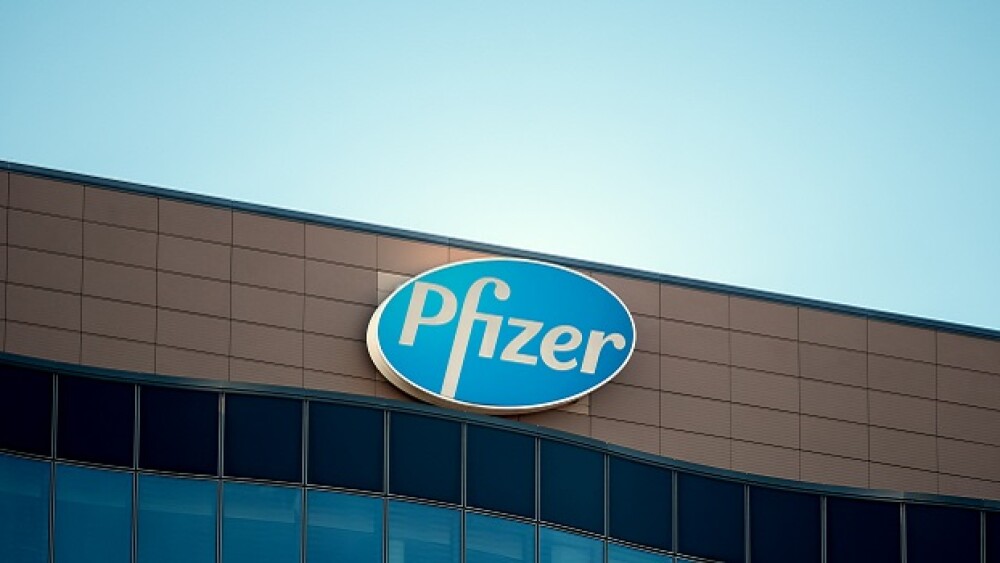The company’s pipeline changes come as it weathered a nearly 30% decline in first-quarter revenues due to a slowdown in its COVID-19 business.
Pictured: Blue and white Pfizer sign on building/cbies/Adobe Stock
Fresh off its $43 billion acquisition of Seagen, Pfizer is making deep cuts to its Phase II pipeline in cardiology and inflammatory diseases, the company revealed Tuesday during its first-quarter financial report.
On Pfizer’s chopping block is temanogrel, an inverse agonist of the serotonin 2A receptor being trialed for microvascular obstruction and Raynaud’s phenomenon related to systemic sclerosis. Pfizer is also dumping its cardio candidate APD418, an antagonist of the beta-3 adrenergic receptor in Phase II studies for acute heart failure.
Pfizer obtained access to temanogrel and APD418 from its $6.7 billion buy of Arena Pharmaceuticals in December 2021. Tuesday’s pipeline cuts leave etrasimod, an orally available selective sphingosine 1-phospate receptor modulator, as the only mature Arena molecule on Pfizer’s pipeline.
In May 2022, Pfizer posted data from two pivotal trials from the Phase III ELEVATE UC registrational program, showing that etrasimod significantly improved remission rates in patients with moderate-to-severely active ulcerative colitis. In December 2022, the FDA accepted etrasimod’s New Drug Application in this indication, with a decision set for the second half of 2023.
Etrasimod is also being trialed in other immuno-inflammatory conditions such as Crohn’s disease and alopecia areata.
Pfizer’s pipeline clean-out also included the biologic blocker of the TNFSF15 protein for ulcerative colitis and the CXCR2 antagonist RIST4721, which was in Phase II studies for hidradenitis suppurativa and palmoplantar pustulosis.
RIST4721, initially developed by Aristea Therapeutics, works by suppressing inflammation. In July 2021, concurrent with a $63 million Series B funding round, Aristea inked a strategic partnership with Arena to advance the candidate through the clinic.
However, in February 2023, Aristea announced that it was discontinuing the development of RIST4721 due to safety concerns, forcing the company to shutter its operations.
Business Beyond COVID-19
For the first quarter of 2023, Pfizer posted nearly $18.3 billion in revenue, down 29% from the same period during the prior year.
Much of this downtrend could be attributed to the drop in coronavirus-related sales, said Pfizer CEO Anthony Bourla during an investor call Tuesday. Revenues in non-COVID-19 products grew 5%, driven mainly by its anticoagulant Eliquis (apixaban), migraine drug Nurtec ODT (rimegepant) and sickle-cell disease therapy Oxbryta (voxelotor).
Pfizer still expects to hit its target of 7% to 9% operational growth for its non-COVID-19 revenues in 2023, which will be due mostly to product launches in the second half of the year.
Among these is Zavzpret (zavegepant), a nasal spray for acute migraine in adults that Pfizer won from its $11.6 billion buyout of Biohaven. Two Phase III trials showed that compared with placebo, Zavzpret led to significantly better pain freedom and freedom from the most bothersome migraine symptom within two hours of dosing. The FDA gave Zavzpret its approval in March 2023.
Pfizer is also pinning its 2023 hopes on its respiratory syncytial virus (RSV) vaccine candidate, which won the backing of the FDA’s Vaccines and Related Biological Products Advisory Committee in March 2023 for its favorable risk-benefit profile in older adults. A final verdict is expected this month.
Similarly, the company is anticipating expanded approval for its prostate cancer drug Xtandi (enzalutamide), allowing its use in non-metastatic castration-sensitive prostate cancer.
Tristan Manalac is an independent science writer based in metro Manila, Philippines. He can be reached at tristan@tristanmanalac.com or tristan.manalac@biospace.com.






